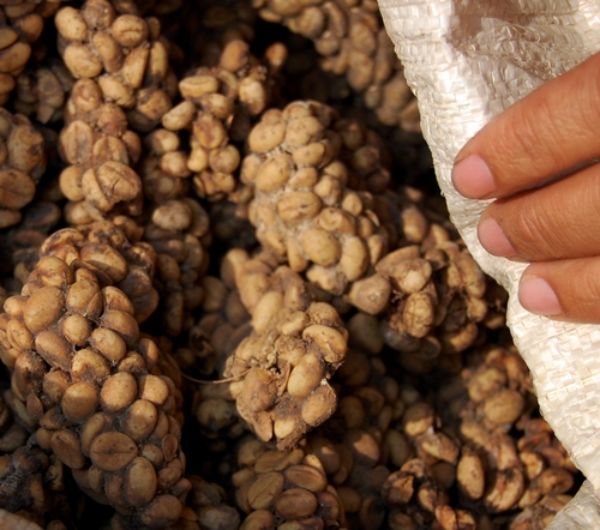If you’re a coffee aficionado, you may have already tasted kopi luwak, or “cat poop coffee,” a uniquely fermented coffee. If not, you’ll be paying a pretty penny for the experience: a cup of the brew can cost as much as $80. It’s the most expensive coffee in the world, but it’s not the coffee beans that make it unique—its manner of production is what commands attention.
Cat poop coffee, as you may have guessed, is made from poop, specifically the feces of the Asian palm civet, a mostly nocturnal catlike mammal. The coffee is made by retrieving the coffee cherries from the digested mass, then roasting and packaging the cherries as elite and exclusive coffee beans. Producers argue that coffee cherries that have traversed a civet’s digestive tract experience an exclusive combination of acids, enzymes, and gastric juices that permeate the endocarp and break down storage proteins, creating shorter peptides and altering the aroma and composition of the coffee.

Most believe the digestive process is the main advantage of recovering coffee cherries from civet poop. But it’s been suggested that wild civets may have well-honed senses, allowing them to select and digest only the best coffee cherries. Yet another theory is that the stress levels experienced by the civets could positively or negatively contribute to the resulting coffee’s taste and aroma.
Read more: Brooklyn Cat Cafe – Where Valiant Rats Care for Orphaned Kittens
Depending upon the choices made in processing, roasting, aging, and brewing of the recovered beans, as well as the type and origin of the coffee beans, kopi luwak can have a variety of tastes and aromas. However, all agree that cat poop coffee is a smoother cup of coffee with lower acidity and a remarkably delicate flavor. Whether these qualities are desired or not is an object of heavy debate, with kopi luwak’s critics claiming that the coffee is thin and flavorless.
Cat poop coffee’s taste notwithstanding, the high labor demand and high price tag combine to produce an industry rife with poor imitations, misleadingly labeled products, and a farming method that involves keeping civets in cages and force-feeding them coffee cherries to allow for higher production and lower costs.
In Southeast Asia, hundreds of thousands of civets are captured in the wild and brought to farms with battery cages to produce the coveted cat poop coffee. These civets are kept in tiny cages made of a metal wire mesh, where they are force-fed coffee cherries indiscriminately. This diet is wildly unsuited to maintaining the health of the civets but maximizes profitability for the farmers. Similarly, the cramped and unsanitary conditions increase stress and lead to high mortality rates for the collected civets. It’s common to see civets so stressed that they lose their hair or aimlessly pace around in their tiny cage in an attempt to soothe themselves. Even worse, demand for cat poop coffee encourages poachers to collect any civets they find, leading to a conservation crisis as wild civets continue to decline in number.
Even Tony Wild, the coffee executive who created the initial buzz surrounding kopi luwak, has changed his tune and created a Kopi Luwak: Cut the Crap campaign. To bolster interest and expose more people to his campaign, he partnered with Change.org and World Animal Protection (WAP) to encourage people to stop buying cat poop coffee. Without the demand for this exotic and novel variety of coffee, unethical farmers would have no incentive to continue torturing civets in tiny, dirty battery cages. The lack of demand would also remove the incentive to poach these small mammals, allowing their numbers in the wild to increase from their current, sometimes precipitously low state.
His campaign has already succeeded, with several retailers in Canada, the Netherlands, Scandinavia, and the UK refusing to stock cat poop coffee. Some coffee certifiers are also prohibiting its development on their estates, pushing its production further into the periphery of the coffee experience.
But amidst animal cruelty and bad press, a company named Rarefied is determined to harvest civet scat and create cat poop coffee exclusively from wild civets with varied diets, absolute freedom, and lower stress levels than their caged cousins. At the point of collection, it’s easy to discern the difference between wild and caged civet feces, leading to the instant dismissal of any farmer that attempts to pass off caged civet feces as those of its wild variant. This dismissal and several other strict policies simultaneously protect wild civets and the quality of their product. The company sells its coffee as Sijahtra, and its price tag is a shocking $250 for 3.5 oz (100 g) of coffee beans. But for a coffee that is the height of luxury, Rarefied leads the way with its sustainably sourced and ethical product. Maybe the company represents a better way of demolishing the unethical and cruel practices of others in the cat poop coffee market by providing a sustainable and superior product.


